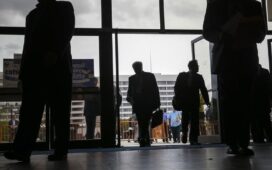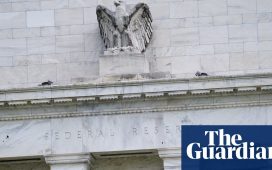The US workforce added 303,000 jobs last month, far more than expected and the 39th straight month of job gains in the US. The unemployment rate dipped to 3.8%.
Joe Biden hailed the report as “a milestone in America’s comeback”.
“Three years ago, I inherited an economy on the brink. With today’s report of 303,000 new jobs in March, we have passed the milestone of 15m jobs created since I took office. That’s 15m more people who have the dignity and respect that comes with a paycheck,” he said.
Economists had expected the US to add 192,000 jobs for the month. Hiring has remained surprisingly strong despite the Federal Reserve’s attempts to cool inflation by raising interest rates.
Over the last 16 months, the Fed has raised its benchmark interest rates from near zero to over 5%. Hikes have been paused recently and the Fed chair, Jerome Powell, said in March that the central bank would cut rates in response to a perceived weakness in the jobs market. The next rate decision is in May.
Inflation has cooled as rates have risen. The annual rate of price rises was 3.2% in February, down from a high of over 9% in June 2022. And to the surprise of many economists hiring has remained robust. Unemployment has now been below 4% for two years, the longest such streak in decades and down from 6.7% when Biden took office.
Healthcare, government and construction lead the gains and the Labor Department reported that employment in leisure and hospitality returned to pre-pandemic levels in February.
Wages rose by 0.3% from the previous month and were up 4.1% over the year, the smallest gain since June 2021.
While the report was far stronger than expected, it once again highlighted the racial disparities in the US jobs market. The Black unemployment rate rose 0.8% to 6.4%, its highest level since August 2022. Rates for Asians (2.5%) and Hispanics (4.5%) decreased while White unemployment was unchanged at 3.4%.
The report is likely to bolster the Fed’s reluctance to begin cutting rates soon.
“Reducing rates too soon or too much could result in a reversal in the progress we’ve seen on inflation and ultimately require even tighter policy to get inflation back to 2%,” Powell said this week at a business conference at Stanford. “But easing policy too late or too little could unduly weaken economic activity and employment.”
Paul Ashworth, chief North America economist at Capital Economics, said the “blockbuster” report “supports the Fed’s position that the resilience of the economy means it can take its time with rate cuts, which might now not begin until the second half of this year.”
In February 2024, non-farm employment in the US increased by a revised 270,000 jobs, with the unemployment rate rising to 3.9% from 3.7% the month prior.
On Wednesday ADP, the country’s largest private payroll company, said US businesses added 184,000 new positions in March, the largest rise since July last year.










